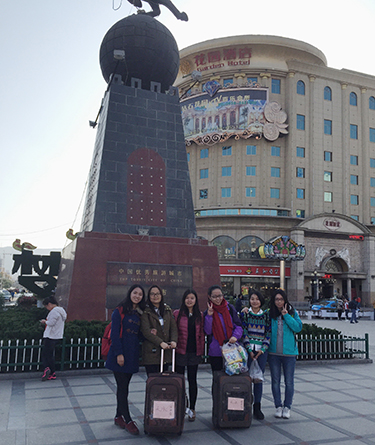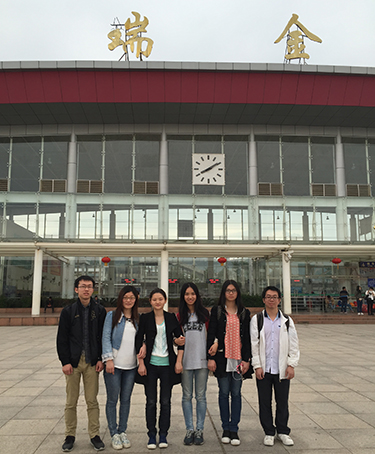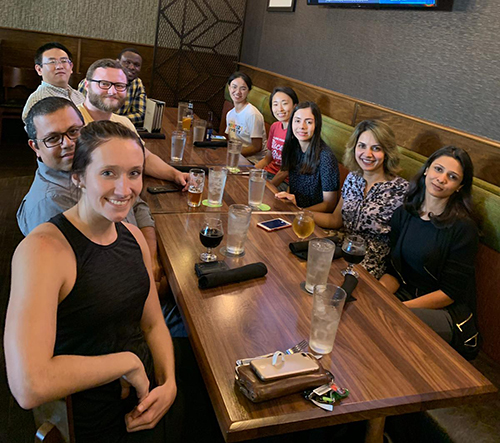
Field experiments and visiting scholar opportunity stirs student's interest in studying agricultural economicS
Fei began her academic journey studying finance at Xi'an Jiaotong University. However, after earning a bachelor's degree, Fei realized that she'd lost interest in the field.
"After I obtained my bachelor's degree in finance, I found I was not interested in it, so I decided to attend graduate school and begin focusing on what I really wanted to do in the future," said Fei.
Fei attended Shaanxi Normal University for her master's in economics. It was there that she was exposed to development economics through field experiments that were being conducted in rural China.
Development economics is a branch of agricultural economics that focuses on improving a wide-range of economic and social conditions in developing countries, and their effects on topics like education, health, working conditions, and population growth.


Pictured above (left) Fei with classmates in Tianshui Gansu China; (right) Fei with classmates in Ruijin Jiangxi China.
"The field experiments I participated in mainly focused on topics of development economics and economics of education. For example, one project I involved in aims to evaluate the causal effect of teacher performance pay on student achievement using random controlled trial (RCT) in rural China. I was involved in the whole process of this project, including designing the questionnaire, interviewing with teachers and students, analyzing data, etc. I found it was very interesting to talk with respondents, which helped me form my research idea and think about whether my research question can solve a real problem."
After completing her degree, Fei wanted to learn more about the field of development economics and that led her to accept a visiting student opportunity at U.C. Berkeley Haas School of Business.
"I was fortunate to be accepted as a short-term visiting student at UC Berkeley. During that period of time, I mainly worked on a paper about the evaluation of several RCT programs on academic achievement of junior high school students. Additionally, I was curious why same interventions had different impacts on students in junior high and primary schools."
While at the university, Fei was also able to attend seminars on a variety of economic topics, outside of the development field, and found a particular interest in agricultural business.
"Although my research focus was in development economics, I was trying to learn about other fields in agricultural economics. I became very interested in the field of agribusiness and food markets, which incorporates research that is important to people's daily life. When researching Ph.D. programs, I learned that Purdue Agricultural Economics Department is one of the top programs in this field. I decided to apply and ultimately accepted admission into Purdue's Ph.D. program."
Now at Purdue, Fei works alongside major advisor, Dr. Steven Wu, and RA advisors, Dr. Meilin Ma and Dr. Joseph Balagtas. She is currently examining agricultural industrial organization and food retail markets and is actively working on her dissertation.
"Specifically, I am interested in non-price strategies of retail stores, market segmentation and retailers' nonlinear pricing strategies, and demand estimation of food products."
"In my dissertation, I'm first trying to apply the Machine Learning method to market segmentation, and investigate whether this data-driven method affects retailers' profitability when they conduct second- and third-degree price discrimination. My second essay focuses on the product assortment adjustment of retail stores when they face a state-level unit pricing regulation."
Fei enjoys the research because pricing impacts all consumers, including herself.
"In my daily life, I like going to the supermarket and observing how stores change their prices and assortment of products, which makes me think about how I am influenced as a consumer. As a researcher, I find it is important to understand retailers' reactions to policies/regulations since it might cause unintended welfare effects that are ambiguous to consumers. Meanwhile, stores' non-price strategy is barely investigated by previous research when we evaluate regulation/policy effects, perhaps because it is difficult to measure. Thus, I find my work interesting and it has important policy implications."
In her next steps, Fei is looking at defending her dissertation and entering the job market in Fall of 2022. She's thankful to her supportive faculty advisors and peers in AgEcon.


Pictured (left) Fei celebrating with Purdue classmates; (right) Fei volunteering AGEC graduate students as a part ofPurdue's Winterization community program.
"I am grateful to my major advisor, Dr. Steven Wu, and my two RA advisors, Dr. Meilin Ma and Dr. Joseph Balagtas, for their patient guide, which inspired me to do continuous efforts in the path of my academic life. By working with them, I learned what I should do to become a researcher. I also spent a lot of time with my peers in the past four years. We took classes together, did group assignments together, and helped each other to pass prelim and prospectus exams. They are so nice and supportive that I always feel that I am not alone."
